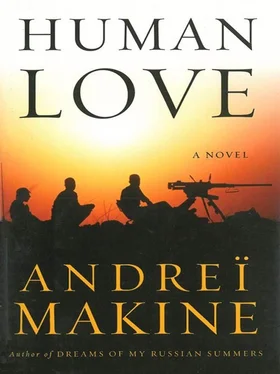One day with the vigor of restored health, he talked about the struggle that could change the face of the world, about playing a part in history… Anna listened to him, made a little uneasy by his enthusiasm. Then he realized that she had been born and lived in a country that had turned history into a divinity and sacrificed millions of lives to create a new humanity. He was disconcerted to realize that what he liked the most in this new world was the very debris of those old lives that had been sacrificed, the “human detritus,” the people of Sarma. It was among these outcasts that he had found true fraternity…
He tried to explain this to Anna and received a reply that was very just in its cruel candor: “You see, the people who live at Sarma don’t expect anything more from life. Perhaps that’s what makes them fraternal. They’re not… how can I put it… They’re not hungry. But I expect a great deal more from my life. Yes, I’m hungry. Later on, perhaps…”
For a long time Elias would retain in his memory the paradox of this hunger, which obliges us day after day to fritter away an existence we know to be false and empty, while the radiance of quite a different life is already known to us.
When the training sessions resumed again, he would reflect during the assault on the “presidential palace” that this scenario of revolution offered a perfect summation of human history: fine words, the thrill of battles and enmities, victories greedy for corpses, and, when its all over, far away from the victors, this calm, gray winters day, the scent of a wood fire, the intense sensation of being at one with oneself.
During his absence, the celluloid doll that marked the children’s room in the “palace” had lost its frilly dress and looked more than ever like a dead baby.
JUST AS HE WAS PREPARING TO LEAVE the “presidential palace,” the chief instructor told Elias to follow him. “There are people in Moscow who want to talk to you,” he informed him somberly Pointless to ask for more details; this secretive mentality was well known to him.
After an hour in a car they found themselves in an office containing monolithic wooden furniture and an abundance of telephones, as if to emphasize that serious matters were afoot. As two individuals greeted Elias without the faintest hint of a smile, the instructor melted into the background. From the first few moments he sensed that this conversation would be more a game of symbols than a genuine exchange. He, the simple young African, was going to have the privilege of glimpsing the machinery of Soviet power. They were going to dub him, to invest him with a mission… The two men, one tall and massive, who looked like a grizzled mastiff, the other dry and athletic, were not very forthcoming. “The interventionist aims of the USA,” “our military assistance to the forces of liberation,” “the Portuguese colonialists,” “probing the secrets of the enemy”: a few such set phrases merely formed the spoken framework for the scene. What was important was focused on the silence of the chief instructor, who had suddenly become a subordinate, the ringing of a telephone, and the grave reply of the gray-haired man: “Yes. Well be drafting a special report for the Politburo.” But above all, on the almost rocklike rigidity of these bodies, the calm ponderousness of gestures and looks designed to embody the unshakable strength of the regime. And it was only at the end, when everyone stood up, that the man-mastiff allowed himself a more informal tone of voice: “Things will be heating up soon in your Angolan homeland. We must be prepared. Well need you, young man… The commander” – he nodded toward the instructor – “will give you all the details…”
Elias was about to discover that these “details” encompassed the training he would receive as a future intelligence agent, his involvement in subversive operations undertaken in Africa, and, quite simply, his whole life, which from now on belonged to the Cause. The arrogant solemnity of the two individuals who had informed him of this, without even consulting him, infuriated him. But at once he recalled that these orders emanated from a power capable of flattening the world a thousand times over with nuclear thunderbolts. And that it confronted another, American, power, equally capable of incinerating the planet. And that in this struggle, in which man had long since been left behind, it might be possible to become a tiny cog, turning in the direction of good. And that for him this good would be for his homeland to become one where there were no longer cities out of bounds to black people.
The months that followed made of him what, as an adolescent, he used to dream of being: a professional revolutionary. What he would be until his death, in fact. Yet when talking to me about that training period, he would tell me: “You know, I became the kind of black man who runs the risk of bursting with the sense of his own importance. One of those Africans who wrinkles his nose up as if the whole world smelt bad. Fortunately some of the comrades with whom I was due to land in Angola were even more puffed up than me. It was really ridiculous. It sobered me up…”
What brought him down to earth in particular was the serene and pitiless fatefulness of his love for Anna. He was unable to tell her about the direction his life was now taking, but, not without a certain exultation, he gave her to understand that future horizons of dangers and battles in unknown lands were opening up before him. She listened to him in silence, attempting an uneasy smile. Very briefly he experienced a mixture of pity and triumphalism, that infamous combination that is present to a varying degree in all love. He at once felt ashamed, embraced Anna, and swore to return to her, despite the continents separating them. He truly believed in this promise!
Years later he would recall that brief moment of boast-fulness and his hasty repentance. He had never been superstitious, but that was the day, he would later tell himself, when his love for Anna, if it were to be preserved, should not have been tarnished by even that tiny degree of infamy. And she herself would much later confess to him that when she heard him talking about his likely departure for foreign lands, she had resolved to die rather than return to Sarma…
But that March evening he believed they were bound to be together always, wherever it might be. For Anna, too, this seemed so vibrantly evident that she murmured these confused words, as if half in a dream: “You may have to live far away and go for a long time without seeing me, but well still feel we’re together, won’t we?” These clumsily whispered words were at once a declaration of love and a premature farewell.
From that evening onward everything came in a rush. History bolted: within a few weeks the dictatorship in Portugal collapsed, and there was Increasing talk of decolonization in Angola very soon. Elias remembered the two individuals who had dubbed him. They, too, must have been caught napping by the speed of events. The training he was undergoing was accelerated; he was introduced to the people who would, sub rosa, be “leading the leaders” in the People’s Republic of Angola, the future of which was already being written in Moscow. One of these gray eminences, who went by the name of Joâo Alves, took him out to lunch several times. Once again Elias felt himself to be “an African wrinkling his nose up.”
He was in this mode the evening he went to Anna’s birthday party. For this her friend Gina had lent her the room she rented in the suburbs. Coming out of the metro station, he slipped on an icy section of pavement and brushed against a group of adolescent youths who were smoking and squabbling around a street kiosk. He ought not to have responded to their curses, should have lowered his head, made off. He stopped, tried to explain. Blows rained down on him, not particularly powerful or well directed, a hail of fisticuffs provoked by the unusual victim. They snatched at the bouquet, which he first tried to protect, knocked off his shapka . Their brutality was different in kind from the aggression at the train depot. Then he had sensed the hatred of mature men. On this occasion these were scrawny young louts whose hands were blue with cold. For them brawling was almost a game, a way of keeping warm. They walked away from him just like children grown weary of an amusement. The whole gang of them abruptly abandoned the attack and ran off toward a more engaging distraction… He felt his face; his nose and lips were bleeding. The trampled flowers lay strewn across the snow. Two buttons were missing from his coat. A little boy walking along with his mother pointed his finger at the tall black man, mopping himself with a handkerchief stained red. Elias had an impulse to thrust both of them out of his way then turned aside and had to make an effort not to weep.
Читать дальше









